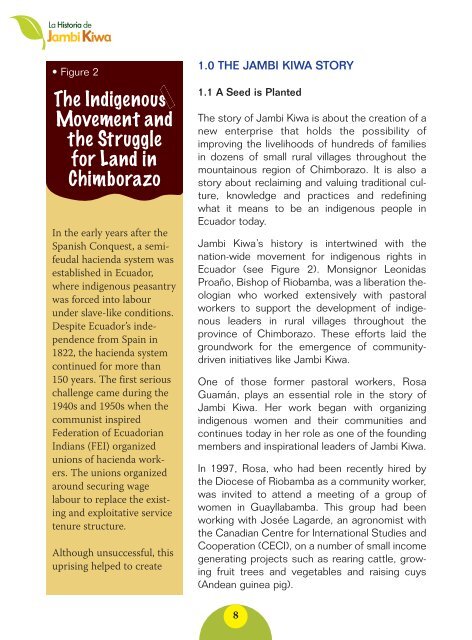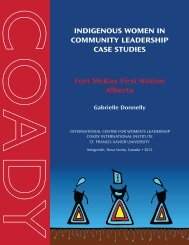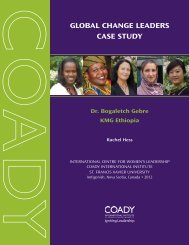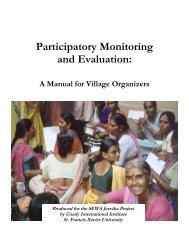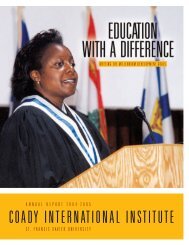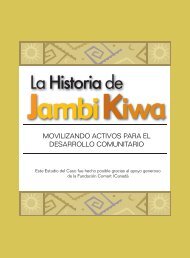Rosa's Story - Coady International Institute - St. Francis Xavier ...
Rosa's Story - Coady International Institute - St. Francis Xavier ...
Rosa's Story - Coady International Institute - St. Francis Xavier ...
You also want an ePaper? Increase the reach of your titles
YUMPU automatically turns print PDFs into web optimized ePapers that Google loves.
• Figure 2<br />
1.0 THE JAMBI KIWA STORY<br />
The Indigenous\<br />
Movement andThe<br />
Indigenous\<br />
the <strong>St</strong>ruggle Movement and<br />
for Land in the <strong>St</strong>ruggle<br />
Chimborazo for Land in<br />
Chimborazo<br />
In the early years after the<br />
Spanish Conquest, a semifeudal<br />
hacienda system was<br />
established in Ecuador,<br />
where indigenous peasantry<br />
was forced into labour<br />
under slave-like conditions.<br />
Despite Ecuador’s independence<br />
from Spain in<br />
1822, the hacienda system<br />
continued for more than<br />
150 years. The first serious<br />
challenge came during the<br />
1940s and 1950s when the<br />
communist inspired<br />
Federation of Ecuadorian<br />
Indians (FEI) organized<br />
unions of hacienda workers.<br />
The unions organized<br />
around securing wage<br />
labour to replace the existing<br />
and exploitative service<br />
tenure structure.<br />
Although unsuccessful, this<br />
uprising helped to create<br />
1.1 A Seed is Planted<br />
The story of Jambi Kiwa is about the creation of a<br />
new enterprise that holds the possibility of<br />
improving the livelihoods of hundreds of families<br />
in dozens of small rural villages throughout the<br />
mountainous region of Chimborazo. It is also a<br />
story about reclaiming and valuing traditional culture,<br />
knowledge and practices and redefining<br />
what it means to be an indigenous people in<br />
Ecuador today.<br />
Jambi Kiwa’s history is intertwined with the<br />
nation-wide movement for indigenous rights in<br />
Ecuador (see Figure 2). Monsignor Leonidas<br />
Proaño, Bishop of Riobamba, was a liberation theologian<br />
who worked extensively with pastoral<br />
workers to support the development of indigenous<br />
leaders in rural villages throughout the<br />
province of Chimborazo. These efforts laid the<br />
groundwork for the emergence of communitydriven<br />
initiatives like Jambi Kiwa.<br />
One of those former pastoral workers, Rosa<br />
Guamán, plays an essential role in the story of<br />
Jambi Kiwa. Her work began with organizing<br />
indigenous women and their communities and<br />
continues today in her role as one of the founding<br />
members and inspirational leaders of Jambi Kiwa.<br />
In 1997, Rosa, who had been recently hired by<br />
the Diocese of Riobamba as a community worker,<br />
was invited to attend a meeting of a group of<br />
women in Guayllabamba. This group had been<br />
working with Josée Lagarde, an agronomist with<br />
the Canadian Centre for <strong>International</strong> <strong>St</strong>udies and<br />
Cooperation (CECI), on a number of small income<br />
generating projects such as rearing cattle, growing<br />
fruit trees and vegetables and raising cuys<br />
(Andean guinea pig).<br />
8


